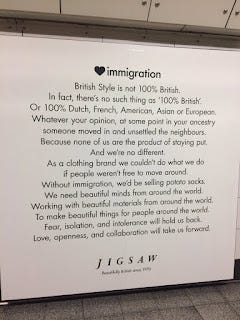Virgin Trains banning the Daily Mail is another brick in the wall of the system of diversity
On one level Virgin Trains’ decision to stop selling the Daily Mail is quite a trivial matter. The company is a private business and can decide not to sell whatever it likes.
But there is also a serious aspect to this, for it shows how some of our major public-facing organisations (including businesses like Virgin and the retailer Paperchase) are explicitly taking the ‘progressive’, liberal-left side in our Culture Wars, and using what control they have over public space to stop the views of opponents from appearing.
According to the story in PR Week, Virgin Trains announced its decision in a memo to staff last year, saying,
“There’s been considerable concern raised by colleagues about the Mail’s editorial position on issues such as immigration, LGBT rights, and unemployment. We’ve decided that this paper is not compatible with the VT brand and our beliefs. We won’t be stocking the Daily Mail for sale or as a giveaway.”
As we can see, the statement is explicitly political, focusing on “the Mail’s editorial position” on “issues” rather than the paper’s sometimes unpleasant headlines howling about ‘MIGRANTS’ and the like. It says that the Mail’s stance on immigration, LGBT rights and unemployment are contrary to its brand and beliefs.
According to PR Week, the campaign group Stop Funding Hate seems to have had no part in this, but its influence is clear for all to see, providing a blacklisting template that anyone can pick up and follow, and for which any public-facing business is a potential target. It is the sort of thing that left-wing activists in Britain used to find themselves on the end of; but they are now in the vanguard in promoting it.
What is perhaps remarkable is how much of the private sector is only too happy to play along. But this is just another in a burgeoning list of examples of how the radical left and business interests have formed an alliance, bridged by the centre left/’centrists’ (including Blairites).
For me, this alliance is one of the political stories of our time. They are gathering principally around mass immigration, which both the left and the private sector want to continue, the left as part of its desire to maximise diversity and business in order to maximise competition and ensure a wide pool of labour (with the centrists believing in both for the most part).
On top of that, as the Virgin statement made clear, the company and its founder Richard Branson are very much in the branding business, for which virtue signalling over political issues is an increasingly popular tool. Last year for example, the retailer Jigsaw wrapped Oxford Circus Underground station in a pro-immigration ad campaign – another example of controlling public space so that the political views of this left-business alliance appear in public in a positive light while those of its opponents either do not appear or do so in a negative light.

Jigsaw's pro-immigration ad campaign, Oxford Circus station, October 2017
(photo from Tara Mulholland)
There is something systemic going on here, in the sense that the call going out from the activists is repeatedly finding a ready and enthusiastic response, not just from pro-immigration businesses but from all sorts of public institutions which are leveraging their access to public space (and their financial resources, including employment ability) to control what can appear in it.
The call and response goes both ways, dragging the two sides into a strange, and strangely comfortable, embrace. This is one thing that I explore in my book, The Tribe: the liberal-left and the systemof diversity, which is coming out later this year.

